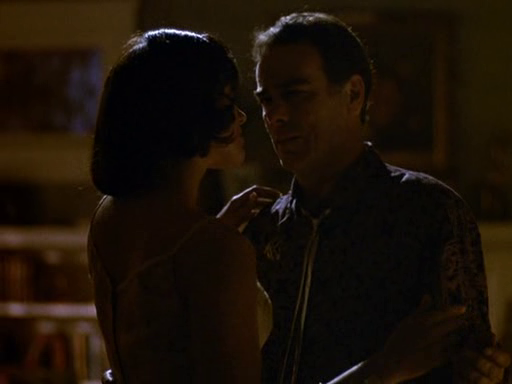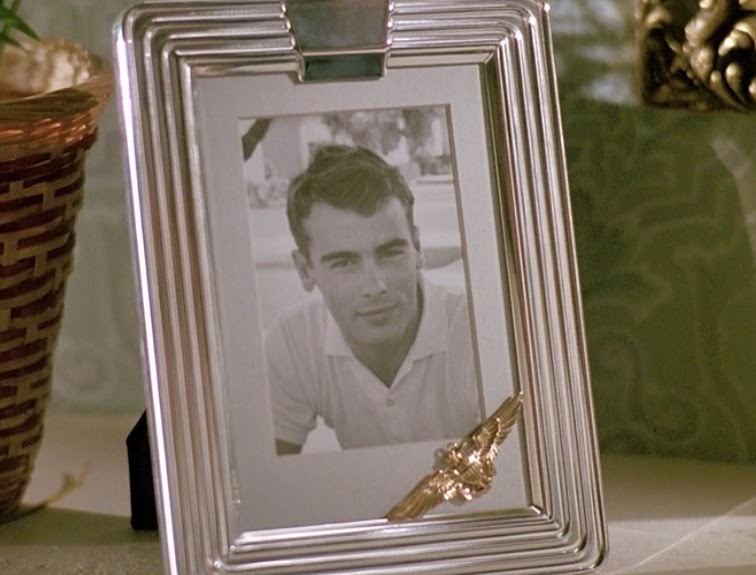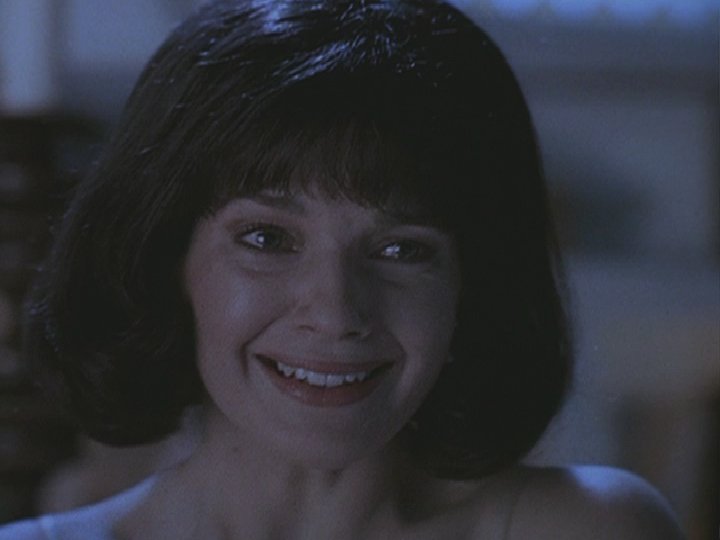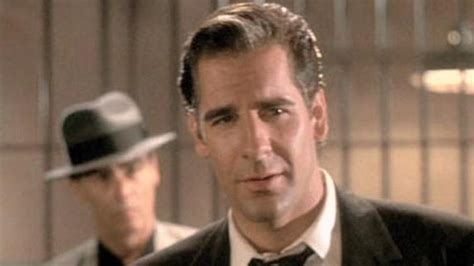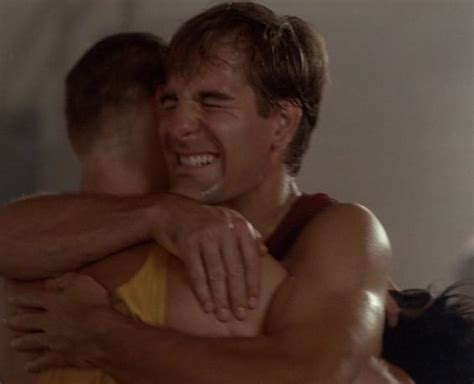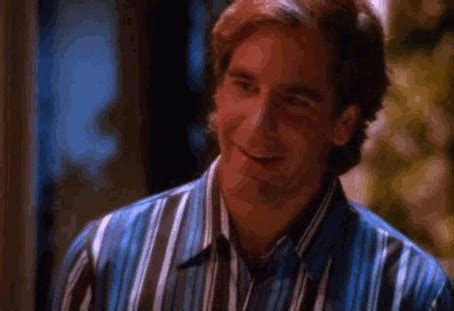|
home | what's new | other sites | contact | about |
||
|
Word Gems exploring self-realization, sacred personhood, and full humanity
Beth and Al
Beth and Al Calavicci
Wikipedia: Quantum Leap, season five, 1993, the final episode, "Mirror Image" In the series finale, Sam arrives at a mining town as himself on the date and exact hour he was born. Patrons of the town bar look familiar from past leaps, but with different names, other patrons seem to be leapers, and Al the bartender (played by Bruce McGill) takes everything in his stride, even when one of the miners who frequents the bar leaps out. Sam theorizes that the bartender might be God, Fate, or Time. While trying to figure things out, Sam has to help save some trapped miners and is told that he controls his leaps and could return home whenever he wants. As much as he wants to go home, Sam decides to go back to [1969] when he met Al's wife on a previous leap [season two, episode "M.I.A."] and tell her that Al is still alive. In the end, Al and his wife remain together [in an alternate reality] and have four daughters. Sam decides to continue leaping.
Kairissi. It’s hard to evaluate these things, but… this episode, this final episode of the entire Quantum Leap series, might be most emotionally moving, not just in reference to episodes of this series but, among almost any other theatrical productions we could mention. Elenchus. I understand. But I’d like to hear your reasons, in your own words, for this assessment. K. (sighing) I suppose it speaks to a universal fear… a universal desire… a universal wish and prayer of the heart. E. (silence) K. Just imagine the intense feelings for this couple. Al is a young Navy-pilot officer, shot down over North Viet Nam...
K. He’s taken prisoner, is m.i.a., suffers harsh conditions in a p.o.w. camp for some years. Beth, of course, receives no mail, no word, from her young husband; and, after a protracted period of time, presumes he is dead. Later, in her loneliness, she decides to attempt to find happiness with someone else, and allows herself to marry. But then Al is released from prison after the war but, to his great sadness, along with hers, discovers that his happy home no longer exists. E. All through the series, Al presents himself as a kind of sex-obsessed male. He marries five times, lives with others, talks about his salacious adventures, and not an episode goes by that doesn’t portray him chasing a short skirt and a tight blouse. But, as Elvis sang, “that was just a lie.” All of this incessant libidinous spirit for Al was just his way of covering over, and distracting himself from, the pain in his life – the pain of losing Beth.
E. Krissi… if you care to… I would like to hear, in your own words, the life-lessons you see in all this. K. I think that… when you lose someone… that one right person for you, then… you might go a little crazy for a while; or, maybe, for a long while. You might do things that don’t represent who you really are, and it's easy to make bad choices that will ruin your life… because… without that one special person… nothing really matters to you anymore; nothing can take away the anger in your heart, the emptiness in your soul… and you might feel so bad about your life that you don't even know you're crazy, or even that you're missing him so much. E. In season two, Sam leaps back to 1969 and finds Beth about to marry another man. Al is extremely frantic and pleads with Sam to do something to stop this. However, Sam feels that his mission is to save someone from being killed, and fails to keep Beth from being with another. K. But, later, in the final episode, Sam resolves to go back again and make things right. He appears to Beth and convinces her that Al is still alive and that she will want to wait for him… (sighing) Elenchus – I spoke of “universals.” And the idea of second chances, of undoing the mistakes of the past, of reconstructing time-lines, is a heart-wish of just about everyone. In their case, Sam was able to save them, to reformulate an alternate reality reflecting what “ought” to have happened for them. E. (sighing) K. (softly) Ellus... do you think that someday… someone might travel back to 1969... and help us, too?
"Don't give up one me... because I'm alive out there... and someday I'm going to come for you."
postscript
K. Elenchus, I stand by my words that this account of Beth and Al is one of the most emotionally-charged love stories. My heart is bursting to say more about their situation, but mere words won’t remove the sorrow I feel for them. Yes, I know, their story is fiction, but it feels very real to me. E. (silence) K. Before we leave this discussion, I’d like to offer a few general comments about the “Quantum Leap” series.
E. Much of it was quite remarkable and inspiring. Dr. Sam Beckett represents the quintessence and best of the American spirit. This farm-boy from Indiana is not only smart and able, thoughtful and scientifically-minded, but wants freedom and prosperity for everyone, irrespective of race, gender, or belief-system.
K. I think what I like best about Sam Beckett is that guileless “boy scout” smile and optimism, his can-do attitude, his selfless desire to help anyone in need; even his enemies. This is more than sensational and the mark of a very advanced spirit. E. In the episodes about the “evil leaper,” he discovers a wicked counterpart of himself and Al. Later, though the “evil leaper” tried to kill him, it seems that he was able to rescue her from the demonic system entrapping her. K. And while the series could have used a technical advisor concerning an errant promoting of a traditional Satan and hell, we admire Sam’s heroic altruism. He reminds us of the Spirit Guides involved in missionary rescue work in the Dark Realms. E. Concerning this rescue work, in the final episode of the entire series, he discovers that there are other altruistic “leapers”, going from mission to mission, in an effort to undo some tragedy. These alternates are ones who had died, prompting a question from Sam, “What if the dead are all leapers!”
K. Now that’s really interesting. As it turns out, every sane person on the other side, in fact, is engaged in service activities of some sort, and some of these efforts issue as trips to the Earth to try help others; that said, however, it's not so easy to help others without hurting them. E. The sentiment is wonderful. The entire motto of the series could be expressed as “putting right what once went wrong.” Again, every sane person on the other side, every Spirit Guide, all the way up the line to highest Divinity, would love to give everyone a happy life and, if it were possible, remove all of the sorrowful elements of the past.
K. We all wish for this. However, as we discussed in the “fairness” writing, God does not, cannot, without injury to our lessons to be learned, swoop in like Superman to save us from our own foibles or, in the short term, those inflicted upon us by others. E. Paradoxically, our mistakes are not meant to be "put right," that is, to be erased and blotted from our memory. They're to become part of our sacred wisdom, and we wouldn't want to give up the lesson. It's part of the very reason we came here. K. And yet, if we take a longer view, all things will yet be put right, and we'll feel good about it. Our mistakes will be given their proper proportion and significance -- during the next many years and decades as we enter the real world. E. Kriss, do you have a concluding comment? K. Overall, I liked this television series. I must admit, however, one of the final items in the last episode made me go cold. After Sam changed the past for Beth and Al, allowing them to have a happy life, on the screen flashed a last word: “Dr. Sam Beckett never returned home.” E. In other words, by his own choice, he continued “leaping” in time to help others and never found happiness for himself. K. Now, some would say, self-sacrificial service-love is the highest form of happiness, and so the service work itself was Sam’s reward and happiness. It’s a nice thought, but… I think this is error. It would not be possible to live that way indefinitely. E. This final summary-statement of Sam’s life reflects a philosophy that we’ve encountered often, but not one that is sustainable. It does not reflect “ultimate reality” nor, as we learned from the “500 tape-recorded testimonies from the other side,” is it possible, for any external source, to help others, to save others, in any meaningful and lasting way.
|
||
|
|
